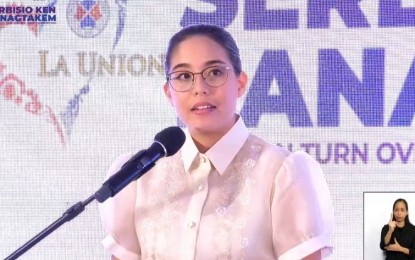
FUNDING REQUIREMENTS. La Union Governor Raphaelle Veronica Ortega-David in a photo taken during her inauguration on June 16, 2022. On Wednesday (June 26, 2024), she calls on the Sangguniang Panlalawigan (Provincial Board) members to pass resolutions to complete the requirements to help finance the PHP300- million Ramut-Puguil farm-to-market road rehabilitation project under the Philippine Rural Development Project (PRDP). (Screenshot from Province of La Union's Facebook live stream)
MALASIQUI, Pangasinan – The proposed rehabilitation of the seven-kilometer Ramut-Puguil farm-to-market road project in La Union is expected to benefit at least 1,500 households and upland farmers in the province as well as those in neighboring Benguet province.
The PHP300-million Ramut-Paguil project is a seven-kilometer farm-to-market road project that will traverse directly to the villages of Ramut and Puguil in Santol town.
La Union Provincial Agriculturist officer-in-charge Sharon Veloria, in a virtual forum spearheaded by Governor Raphaelle Veronica Ortega-David on Wednesday, said three other villages in the town of Santol - - Tubaday, Sasaba, Sapdaan; another village in Sudipen; and even a village in Benguet province will benefit from the road rehabilitation.
“Santol town is near Benguet and some farmers from Benguet prefer to bring their produce through Santol hence, the service area to be covered by this project is huge,” she said in Filipino.
“Aside from the fact that these are geographically-isolated and disadvantaged areas, there are also indigenous communities in these villages or 3,234 indigenous people beneficiaries,” she said.
Since the area is mountainous, part of the project component is the construction of slope protection on the top and the bottom part of the road network, she said.
“There is a part of the seven-kilometer for a road opening while some parts are tire tracks or only the track for the vehicle’s wheels are concreted while the middle part of the road is still made of gravel and stones. These villages’ terrains are high and very rough,” she added.
With the expected benefits, Governor Ortega-David called on the Sangguniang Panlalawigan (Provincial Board) to pass the necessary resolutions to have the funding for the infrastructure project.
The Department of Agriculture (DA) approved the proposal for the project, to be funded under the World Bank’s Philippine Rural Development Project (PRDP), in 2017 pending the submission of requirements such as feasibility studies, right of way clearances, permits, and consultations with stakeholders.
Ortega-David said the provincial government is required to have a 10 percent equity but the project cannot push through pending the approval of the necessary SP resolutions, which needs to materialize before the June 30, 2024 deadline.
Once approved, the targeted completion days will be 669 days, she said.
Peace and Order
Ortega-David, who is also the chairperson of the Regional Peace and Order Council in Ilocos Region, said strengthening of road network and connectivity is also crucial in maintaining peace and order.
“It is big thing since we will be able to give the people direct services and they would be able to feel the government’s presence. It is very important in peace and order since at least we know that the upland villages will not be penetrated (by anti-government propaganda),” she said adding that it would ultimately to make the lives of the people better.
Ortega-David said this project can also open up opportunities for farmers even from other towns and provinces.
“I have learned that some farmers only plant for themselves and they no longer sell their produce due to high transportation cost but if this will be constructed, it would open opportunities for them,” she said in Filipino.
The PRDP is a national project under the DA that aims to establish a modern, value-chain oriented, and climate resilient agriculture and fisheries sector. It is jointly funded by the World Bank, the national government and the local government units. (PNA)
